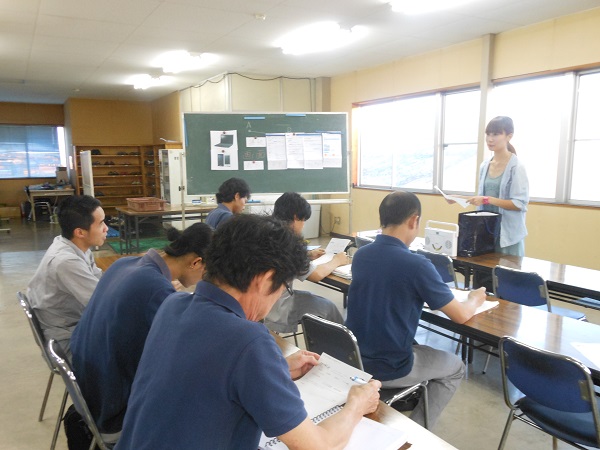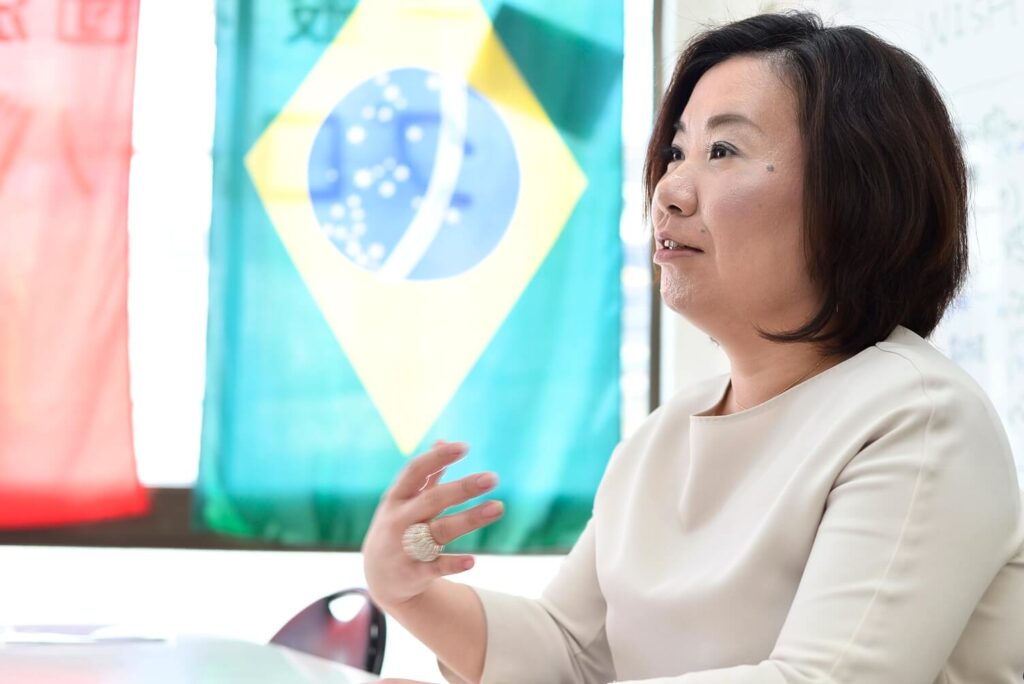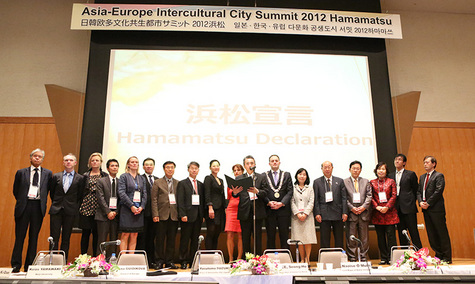2022.10.12
OTHERSThe Japan Foundation Prizes for Global Citizenship—Linking the Regions of Japan with the World

A used keyboard harmonica donation program is run by Hamamatsu Global Human Resources Support. Every year, university students in the city collect about 100 keyboard harmonicas from city residents and donate them to the city of Davao, the Philippines, to support music education and international exchange. Photo: © Hamamatsu Global Human Resources Support
The Japan Foundation supports the leaders of international exchange throughout Japan. Here, the focus is on the Japan Foundation Prizes for Global Citizenship and the Intercultural Cities Programme, whereby cities around the world address the challenges of local internationalization in ways that transcend national borders.
In the 1980s, Japan established itself as an economic powerhouse. As opportunities for interaction with foreign countries increased through business and travel, the need for internationalization became more and more of a point of focus in Japan. As local communities have become increasingly active in promoting international exchange, local governments have established a series of associations and centers for international exchange. The Japan Foundation (JF) also established the Cultural Exchange Bureau to promote international exchange in various regional communities across Japan, as well as the Prizes for the Promotion of Community-Based Cultural Exchange in 1985, with the aim of highlighting model cases.
The Immigration Control and Refugee Recognition Act was revised in 1990, and the Technical Intern Training Program was introduced in 1993, resulting in a dramatic increase in the number of foreign residents in Japan and changing the role of local international associations. While in the 1980s, the main focus of these associations’ activities was on fostering international goodwill and exchange, they now have the additional role of addressing internationalization within Japan: welcoming residents from foreign countries into the community. In 2004, the Prizes for the Promotion of Community-Based Cultural Exchange was renamed to the Japan Foundation Prizes for Community-Based Cultural Exchange. The name was then further changed to the Japan Foundation Prizes for Global Citizenship, with the hope that individual citizens would become global citizens with connections to foreign countries.
Currently, the Japan Foundation Prizes for Global Citizenship honors organizations and individuals who are engaged in remarkable activities in the fields of “regional development through arts and culture,” “harmony between diverse cultures,” and “citizen collaboration and international mutual understanding.” Prizes are given to unique and progressive organizations throughout Japan based on the following evaluation criteria: whether the unique and progressive nature of their activities is in line with social issues; whether the passion exhibited by the leaders of the organization has been effective in involving citizens; whether the organization is open to the community; and whether the impact of their activities is likely to be sustained into the future.
In 2021, the following organizations were recipients of this prize: El Sistema Japan (Tokyo), which supports children in Fukushima Prefecture, Iwate Prefecture, Nagano Prefecture, and other regions through music; Mundo de Alegria School (Shizuoka), which supports the education of children of Japanese descent who have come to Japan from South America; and Door to Asylum Nagoya (Aichi), which supports refugee applicants in the Tokai region.
The Japan Foundation Prize for Global Citizenship Helps Hamamatsu Global Human Resources Support Find Its Way
In the 38 years since the award was established, 115 organizations from Hokkaido Prefecture in the north to Okinawa Prefecture in the south have been recipients. One organization that has grown significantly in recent years as a result of winning this prize is Hamamatsu Global Human Resources Support (Shizuoka), which now serves as a role model for regional revitalization in the era of multicultural harmony.
Hamamatsu Global Human Resources Support received the award in 2018. This coincided with the revision of the Immigration Control and Refugee Recognition Act, which added the new status of residence, “Specified Skilled Worker.” The organization is based in Hamamatsu City, Shizuoka Prefecture, which is home to many people from foreign countries. They provide Japanese language education and employment support based on their own unique curriculum, with the aim of developing foreign human resources, primarily in the nursing care industry.

In-house Japanese language training conducted by Hamamatsu Global Human Resources Support. They offer training in Japanese that can be used in the workplace, aimed at technical intern trainees, specified skilled workers, engineers, and other trainees from foreign countries. Photo: © Hamamatsu Global Human Resources Support
Representative Director HORI Hisano spoke about the significance of receiving this award. “The Mayor of Hamamatsu and local business leaders have also congratulated us on winning this award. Our circle of supporters has expanded, and when it comes to foreign human resources, we have been able to create momentum for innovation throughout the region. We have also been getting more opportunities to speak with central government agencies. We would like to create a world in which everyone considers people from foreign countries to be partners in developing their local communities, and in which it is natural for these people to play an active role. The fact that there are so many residents from foreign countries can be seen as a strength of Hamamatsu. We want to provide stable employment opportunities by involving ourselves on both sides of the equation when it comes to foreign workers—improving their skills by helping them to acquire the qualifications they will need in the future, and enhancing the environments of the companies that accept them.”

Ms. HORI Hisano established Hamamatsu Global Human Resources Support in 2011 and became representative director of the organization in 2012. She also serves as a Regional Japanese Language Education Promotion Advisor to the Agency for Cultural Affairs and a Regional Internationalization Promotion Advisor for the Council of Local Authorities for International Relations. Photo: © Hamamatsu Global Human Resources Support
The prize has presented Ms. Hori with the opportunity to strengthen cooperation with local governments and to create a system that, in addition to matching human resources with companies, also provides follow-up support after employment. “Hamamatsu is considered a microcosm of Japan. We’d like to improve workplace environments from the perspective of human rights and business, so that diverse groups of people, not just those from foreign countries, can play a more active role in society, and we’d like to do that in Hamamatsu City—this city that promotes multicultural harmony. By creating a system for human resource development, we hope to help develop the city into one that’s internationally recognized and attracts excellent human resources from all over the world.”
What Are Intercultural Cities?
In 2017, the year before Ms. Hori and her team won the prize, Hamamatsu became the first city in Asia to be admitted to the Intercultural Cities Programme (ICC) promoted by the Council of Europe. ICC is a program that was launched in 2008 to improve the attractiveness of municipalities by utilizing the diversity brought by immigrants and minorities in city planning and connecting them with other like-minded cities around the world. JF is also working with the Council of Europe on this program.

The “Asia-Europe Intercultural City Summit 2012 Hamamatsu” was held in October 2012, co-organized by JF, Hamamatsu City, the Council of Europe, and the Council of Local Authorities for International Relations. Participants included local government heads and practitioners from Japan, South Korea, and three European countries.
Prof. YAMAWAKI Keizo of Meiji University, who specializes in immigration policy and interculturalism and who is a leading scholar on the ICC in Japan, describes the ICC as “a third path that is neither assimilationism nor multiculturalism.” “Multiculturalism is known to have achieved some success in Canada and Australia, but in Europe it has been reconsidered due to criticism that it creates segregation between immigrants and citizens, as well as social division. European cities are interested in the ICC as a ‘third path’ because of its key word, ‘interaction,’ which involves engaging and mixing people with different cultural backgrounds, while respecting diversity. I believe that Japan’s vision of ‘tabunka kyosei’ should also incorporate such ideas while at the same time communicating the Japanese experience to the rest of the world.”
The ICC program aims not only to address issues facing communities in which citizens of different cultural backgrounds live together, such as education and healthcare, but also to promote community development based on the vitality and innovation that diversity could bring about. Prof. Yamawaki said, “The ICC advocates that diversity should not be seen as a nuisance, but as something to be taken advantage of to make cities more vibrant. I think such a perspective is an appropriate one for JF to continue working towards in coming years.” This is a vision of the future that also overlaps with the “innovation of foreign human resources” envisioned by Ms. Hori of Hamamatsu Global Human Resources Support. JF supports regional revitalization and local development, from international mutual understanding and cultural exchange to the development of a thriving society through intercultural interaction.
【Related page】
What is Needed to Communicate Effectively? The Path to Mutual Understanding as Shown by Japanese Language Learning Video Materials
